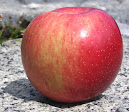
The gang of hard-cider bloggers is having so much fun I had to write at least one cider review of my own.
Besides, I do get thirsty.
Bampkins pours pale straw from a 22-ounce bottle. In some light the cider in the glass has silvery green highlights. There are aromas of apples, cheese, and apple vinegar.
This cider is very dry and mildly astringent, fruity-sour with just a little funk.
Carbonation adds punch, but the absence of sugar makes this a subtle drink.
These flavors are clear and refreshing, with a clean finish mixed with the tiniest bit of beer sour. We enjoyed ours with a chicken dinner.
Where American ciders like Woodchuck and Angry Orchard weigh in with more than 20 grams of sugar per glass, Fatty Bampkins Dry has but 1. If all you know are sweet ciders, consider this one a completely different sort of drink. A little like going from a malty lagger to a hoppy ale.For all that, Fatty is not hard to take. It's a sort of cleaned-up version of the French brut ciders that are not shy about mixing a little barnyard with the pomme. Fatty B has only a little of the former and it works very well.
 |
Fatty Dry is one of two ciders from the Blacksmith Winery, based in the pomalicious State of Maine. The cider is barrel-fermented (with yeast) and aged, and blended, 6.8% alcohol.
Of the apples in question, Bampkins only says there are 6 varieties and they are pressed separately and locally.
I quite like a dry cider and this one has not gotten much love from the fruit-drinking world. It makes me wonder if I am out of step with the cider bloggers.
Beer reviewers (more used, perhaps, to sour and funky) have given Fatty more respect, and the cider has won awards and accolades.
Not sure I've really done justice to Fatty B, as this is my first cider tasting and there is a learning curve, just as there is reviewing apples.
If you try some, tell me what you think.

On the topic of dry cider, from the perspective of a small scale home cider brewer:
ReplyDeleteWhen brewing, it takes extra work to make it NOT very dry. The yeast, even relatively low power stuff like an English Ale Yeast, will eventually consume all the fructose in the sweet cider and leave the product almost perfectly dry.
To have some sweetness in the finished cider, you have to either arrest fermentation (e.g. by pasteurization) before it goes to completion, sterilize the cider and add sugar back to it, or add something sweet that yeast can't eat.
I've tried adding a splash of fresh (from the freezer) cider to each glass of my dry hard cider. This was ok, but it was troublesome to arrange for the sweet cider to be available in the fridge all year to blend with the hard cider. It doesn't last all that long once you take it out of the freezer, and my kids usually finish it off quickly once it is out.
I also tried putting in "wine conditioner" from the brew store, which is a non-digestable sugar like lactose and sorbates. You can also use sucralose (Splenda). This was ok, but it seemed wrong to have to adulterate my natural product with this yucky chemical, and it may have been my imagination but it tasted off to me.
I've avoided heat treatments of hard cider, both for the trouble involved, fear of biocontamination from extra handling, and fear of damaging the flavor profile.
So perhaps by virtue of drinking a lot of it over a period of years, I've gotten to really like fully dry hard cider. It is the natural state of hard cider, and I think the dryness lets you focus on the more delicate flavors. I find it refreshing and delightful, and I don't feel it is missing anything for the lack of sweetness.
So three cheers for dry cider!
Here is my friend Ben's writeup on our 2013 cider making:
http://fiveislandsorchard.wordpress.com/2013/10/26/cider-year-nine-roundup/
Holly, Eliza Greenman has suggested that sorbitol from watercore might be a way to add non-fermentable sweetness to cider. It's a chemical name, and indeed a chemical, but one that occurs naturally in apples.
Delete